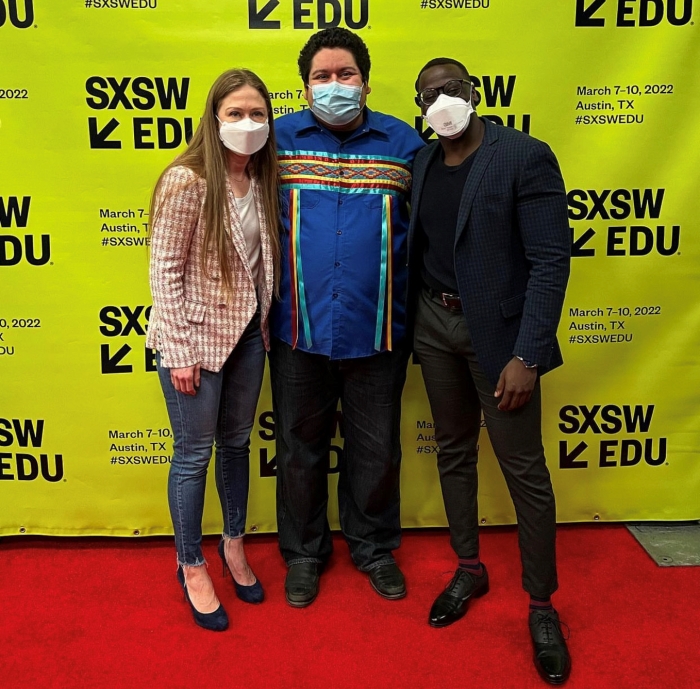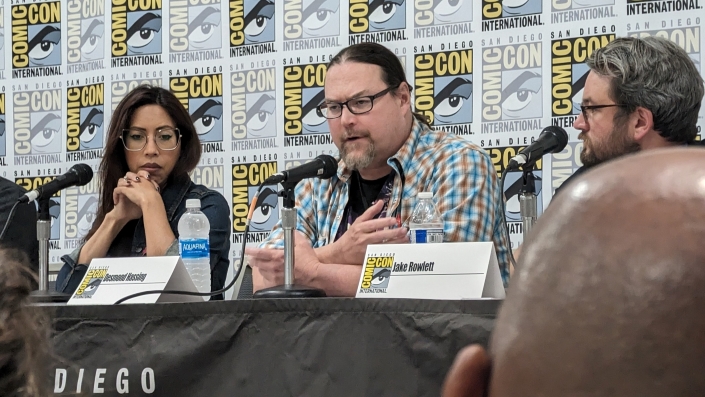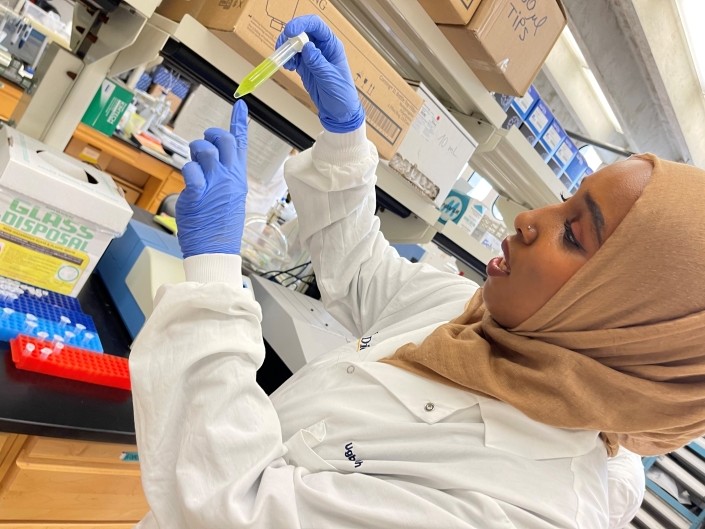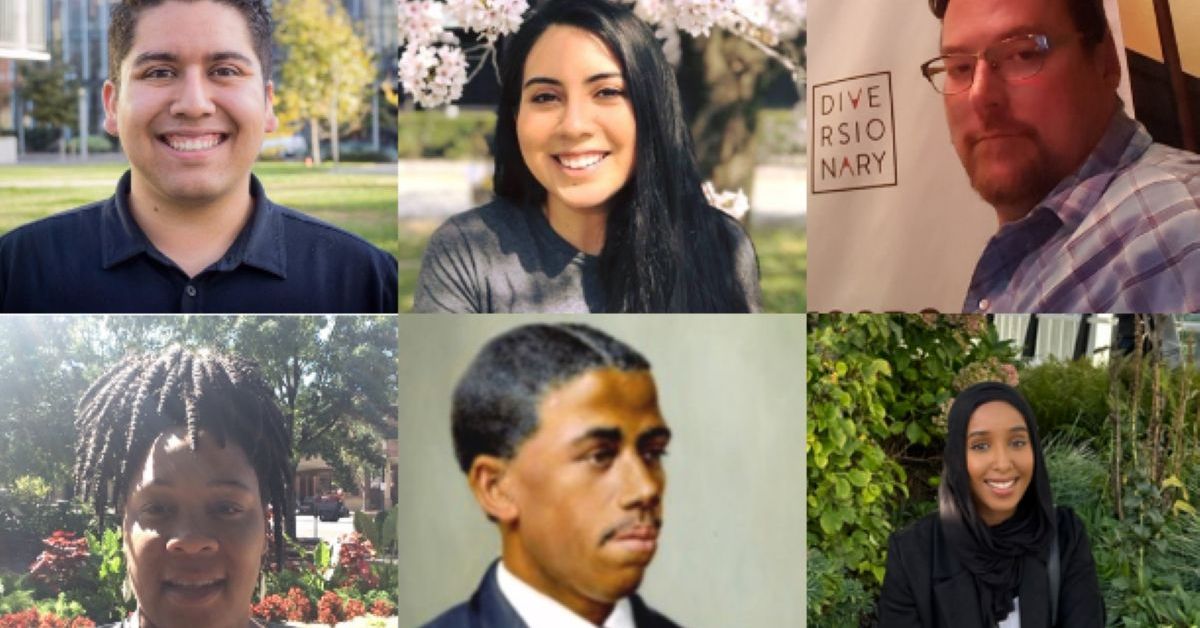Leaders in Their Fields
Five graduate students were recently inducted into the Bouchet Graduate Honor Society.
Published Date
Story by:
Media contact:
Topics covered:
Share This:
Article Content
Five UC San Diego graduate students recently joined the ranks of the Bouchet Graduate Honor Society, a prestigious national organization that recognizes scholars whose commitment to social justice, diversity, leadership and academic excellence pushes the boundaries of doctoral education.
These exemplary scholars are leaders in their fields; they deeply embody the spirit of Edward Alexander Bouchet, the first African American to earn a doctorate degree in the United States in 1876. Bouchet was also the sixth person in the Western Hemisphere to earn a doctorate in physics.
This year’s cohort is committed to improving equity, increasing representation and expanding opportunities and participation in their fields for underrepresented populations.
“The 2024 Bouchet Scholars are all gifted scholars in their own disciplines who harness the power of their scholarly achievements to serve diverse communities that have historically been underrepresented. They are visionaries whose work builds community and belonging and opens the door for others,” said Assistant Vice Chancellor for Student Equity and Inclusion Karen Biestman, who served on this year’s review committee. “Together, they honor UC San Diego’s highest ideals of scholarship, leadership, character, service and advocacy and represent the promise of a place where all are welcome and celebrated.”
UC San Diego is one of only two West Coast universities to be a part of the national society. All scholars attended the 20th annual Yale Bouchet Conference on Diversity and Graduate Education earlier this month in New Haven, Connecticut. This year’s conference focused on “Rediscovering the Legacy of Edward A. Bouchet: A Catalyst for Historical Reckoning."
We chatted with some of this year’s Bouchet Scholars — read on to learn more about our graduate student leaders:

Alec Calac, Public Health and Human Longevity Science (he/him/his)
Calac, who is part of the Pauma Band of Luiseño Indians, is an MD/PhD candidate at UC San Diego School of Medicine and the Herbert Wertheim School of Public Health and Human Longevity Science.
What he researches: As a part of the UC San Diego Medical Scientist Training Program, Calac works to advance tribal health equity in medicine and public health. Specifically, he focuses on integrating ethical, legal and social considerations into medicine when working with American Indian and Alaska Native communities on topics like data sovereignty and responsible digital data stewardship.
Why he’s doing what he’s doing: “My ‘why’ is more of a ‘why can’t we,’” Calac explained. “Health disparities are worsening among Native American communities, and I always ask myself, why can’t we be doing more? We often see issues faced by Native Americans grouped into DEI (diversity, equity and inclusion) efforts, but for me, these are issues of self-governance and self-determination and honoring the broken promises that we have made to tribal communities.”
“As a member of the Pauma Band of Luiseño Indians,” he added, “I have especially challenged UC San Diego School of Medicine to honor its land-grant mission and am proud that we now have a medical education program focused on Native American health.”
A risk worth taking: “A risk not taken will inevitably sit with you as a regret. If you see injustice in the world, then please, take a risk and try to address it. Our communities deserve no less.”
Alicia Escobedo, Language and Communicative Disorders (she/her/hers)
Alicia G. Escobedo is a sixth-year Ph.D. student in the Joint Doctoral Program in Language and Communicative Disorders at UC San Diego and San Diego State University.
What she researches: Escobedo researches typical and atypical bilingual language development. There, she focuses on using community-based research methods and culturally-responsive measures to characterize the language abilities of young children in both of their languages.
“My goal is to help reduce health and educational disparities that affect culturally and linguistically diverse communities,” Escobedo said.
A risk worth taking: “Always apply for opportunities, even if you are unsure if you will be accepted,” Escobedo explained. We’re often our own worst critics, she said, adding that we “never know what kind of opportunities will open up if we take a leap of faith.”
A change she hopes to see in the world: As a native Spanish-English bilingual speaker, Escobedo hopes to empower bilingual children and their families to keep speaking their home language and stay connected to their culture and family through the language. Still, that can be tricky in an English-dominated society.
“I hope to see people celebrating all individuals, especially children, speaking their home language,” Escobedo said, “And I hope to see a society where we support language development in all languages. I hope to see a world where we empower bilingual children, families and communities.”

Desmond Michael Hassing, Drama and Theatre (he/him/his)
A San Diego native and enrolled member of the Choctaw Nation of Oklahoma, Hassing is a sixth-year Theatre and Drama Ph.D. student in the Department of Theatre and Dance.
What he researches: “My research centers on analyzing and interpreting our cultural products (films, TV, comic books, books, sports rituals) not as amusements, but instead as intentional war messaging intended to carry out a psychological operations campaign meant to format and build society,” Hassing explained, adding that this type of messaging can be seized by disempowered citizens when trying to make societal changes.
Why he’s in academia: Hassing found his way to academia because he wanted to become a better elder for his people — the Choctaw Nation and the students he mentors on campus.
“We all need to learn a way of being in the world, and everything I study is bent to a practice of improving that process of becoming for the generations behind me.”
A risk worth taking: For Hassing, who struggles with severe social anxiety, meeting new people is a risk; sometimes, he pushes people away and dwells on past interactions. Remaining optimistic is a challenge — he knows that it’s worth it.
“Even though it scares me, we should all strive to meet as many people as possible. We have serious challenges to overcome and we will always be stronger and more resilient together than we could be apart.”
“Even though it scares me, we should all strive to meet as many people as possible. We have serious challenges to overcome and we will always be stronger and more resilient together than we could be apart.”

Ugbad Farah, Biological Sciences (she/her/hers)
Farah is a fourth-year Ph.D. student in biological sciences.
What she researches: Farah’s research specializes in understanding the ecology and evolution of commercially important algae as a potential biofuel source. She investigates how limited light, nutrients and temperature impact algal growth and productivity; ultimately, Farah aims to test how ecological and evolutionary principles can be incorporated into building productive, resilient systems.
Why she’s in science: “Being in the world of science can be a transformative experience for anyone – either an awe-inspiring one that reels you in, or one that turns you away and shuts you out,” Farah said. “Throughout my career, bringing in students with appropriate resources to help them succeed is one way I address my why: everyone deserves a chance to engulf themselves in science.”
A risk worth taking: “Despite the negative inner monologues, despite the harrowing stories I heard, I decided to take a chance with everything and put myself out there despite my imposter syndrome being at its peak: grad school, a career as a scientist, you name it,” shared Farah. “And it has been the most beautiful and rewarding journey of my life so far.”
Danielle M. Campbell, a fourth-year doctoral student at the Herbert Wertheim School of Public Health and Human Longevity Science was also recognized as a Bouchet Scholar. Read more about the scholars here.
Stay in the Know
Keep up with all the latest from UC San Diego. Subscribe to the newsletter today.




